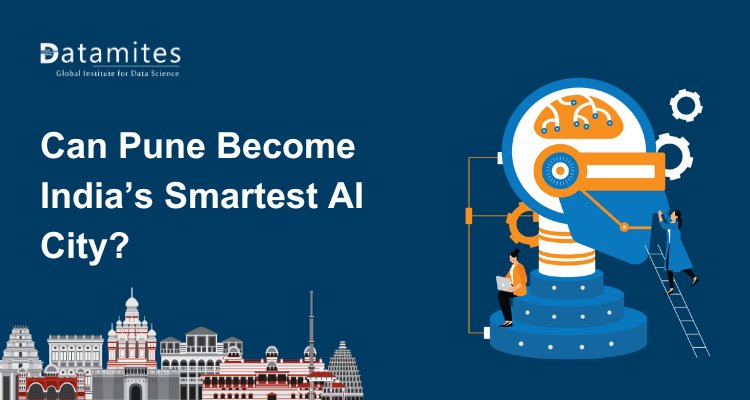Can Pune Become India’s Leading AI-Driven Smart City?
Pune is emerging as a leading AI-powered urban hub. Learn how advanced technology, strong governance, and artificial intelligence courses are shaping Pune’s smart city revolution.

Pune, known as the cultural and educational heart of Maharashtra, has evolved into one of India’s most promising technology hubs. Once famed primarily for its universities and pleasant climate, Pune now stands at the crossroads of innovation, technology, and urban transformation. With rapid digitalization, strong governance, and a growing ecosystem of tech startups, Pune is uniquely positioned to become India’s leading AI-driven smart city.
As cities across the world embrace artificial intelligence (AI) to enhance efficiency and quality of life, Pune’s forward-thinking leadership is already setting benchmarks in smart urban management. From intelligent traffic control systems to digital governance and data-driven decision-making, Pune’s ambition aligns with India’s broader vision for AI-enabled urban ecosystems. The question remains can Pune truly lead this revolution and redefine what it means to be a smart city in India?
Pune’s Current Smart City Status
The journey of Pune as a smart city officially began in 2015, when it was selected under India’s Smart Cities Mission. Since then, the Pune Smart City Development Corporation Limited (PSCDCL) has launched numerous projects aimed at improving livability, sustainability, and digital accessibility for its citizens.
Some of the key initiatives already implemented include:
- Smart Traffic Management: AI-powered traffic sensors and surveillance cameras help reduce congestion and improve road safety.
- Smart Streets and Lighting: LED streetlights with IoT sensors automatically adjust brightness based on pedestrian and vehicle movement, saving energy and enhancing safety.
- Smart Water Management: Real-time monitoring of water levels and consumption ensures efficient resource use and leakage detection.
- Waste Management: Data analytics and AI tools optimize waste collection routes and recycling operations.
- Digital Governance Platforms: Citizens can access municipal services online through mobile apps and smart kiosks.
Pune’s Integrated Command and Control Center (ICCC) unifies data from traffic, sanitation, utilities, and public safety, enabling faster, data-driven decision-making. This foundation supports the city’s move toward AI- and ML-powered governance. According to Grand View Research, the global AI market, valued at USD 279 billion in 2024, is expected to reach USD 3.5 trillion by 2033, growing at a 31.5% CAGR.
Factors Supporting Pune’s AI-Driven Transformation
Pune’s transformation into an AI-driven city is supported by several intrinsic strengths that few Indian cities can match. These factors make it a natural contender for becoming India’s AI capital for smart urban innovation.
1. Strong Educational and Research Foundation
Pune has long been called the “Oxford of the East.” It houses prestigious universities such as Savitribai Phule Pune University, Symbiosis International, and the Indian Institute of Science Education and Research (IISER). These institutions are now offering cutting-edge programs in data science, robotics, and even specialized artificial intelligence courses in pune that equip students with practical AI and machine learning skills.
2. IT and Startup Ecosystem
Pune is home to major IT parks such as Hinjawadi and Magarpatta, where tech giants and startups coexist in a vibrant innovation ecosystem. Companies are increasingly investing in AI, IoT, and big data applications from smart infrastructure monitoring to predictive maintenance tools. Startups like Niramai (healthcare AI) and Repos Energy (logistics AI) illustrate Pune’s capacity for technological creativity, making the city fertile ground for urban AI experimentation.
3. Progressive Governance and Public Initiatives
The Pune Municipal Corporation (PMC) has demonstrated strong leadership in embracing data-driven policies. The integration of technology in urban planning, coupled with citizen feedback mechanisms, has helped the city achieve impressive results in digital inclusion and service delivery.Government-led initiatives such as Pune Data Exchange and AI for Public Safety show that policy support is in place for a scalable AI framework that other cities can replicate.
4. Citizen Engagement and Digital Literacy
For an AI-driven city to thrive, its citizens must be digitally empowered. Pune has made significant progress in promoting digital literacy, particularly among youth and small business owners. Community participation through mobile apps and public dashboards ensures transparency and accountability. This collaborative environment strengthens trust in technology, a crucial component of successful AI adoption.
Refer these below articles:
- What is Retrieval-Augmented Generation (RAG)?
- Small Language Models are the Future of Agentic AI
- Multimodal Neurons in Artificial Neural Networks
Potential AI Applications for Pune’s Smart Future
Artificial intelligence can fundamentally redefine how Pune manages its infrastructure, services, and environment. Let’s explore how AI could be harnessed in key urban domains.
1. Smart Mobility and Traffic Optimization
AI can revolutionize how Pune’s transport systems function. Predictive algorithms can analyze real-time traffic data to dynamically manage signals, prevent congestion, and recommend alternative routes.Public transport scheduling can also benefit from machine learning by adjusting bus or metro frequencies based on passenger demand patterns. Imagine a future where AI-driven electric buses automatically optimize energy usage and routes that’s the next frontier Pune can aim for.
2. Energy Efficiency and Environmental Sustainability
AI-powered sensors and analytics can reduce energy wastage across public facilities and buildings. Smart grids could forecast electricity demand and adjust supply dynamically. In environmental monitoring, AI systems can track pollution levels, predict air-quality fluctuations, and alert authorities before conditions worsen. With Pune’s rapid urban growth, AI-enabled sustainability will be essential to maintaining clean air and green spaces.
3. Predictive Waste and Water Management
Using data from IoT-enabled bins and pipelines, AI can predict waste accumulation and optimize collection schedules.Similarly, machine learning models can detect water leaks, forecast consumption patterns, and recommend efficient distribution plans ensuring sustainability and minimizing wastage. These innovations can make Pune one of the most resource-efficient cities in India.
4. Smarter Governance and Public Safety
AI chatbots can assist citizens in filing grievances, paying taxes, or accessing emergency services quickly. Predictive analytics can help authorities anticipate issues like flooding, disease outbreaks, or power outages. For public safety, facial recognition (implemented ethically and securely) can help track missing persons or identify anomalies in real-time surveillance, always ensuring strict adherence to privacy norms.
Pune is already on the right trajectory to becoming one of India’s most intelligent and future-ready cities. Its combination of academic excellence, a thriving tech ecosystem, forward-thinking governance, and active citizen participation provides the perfect foundation for an AI-driven smart city revolution.
Baner, a vibrant suburb in western Pune, has transformed from a quiet residential area into one of India’s most promising technology and innovation corridors. Over the last decade, Baner has evolved into a IT and AI hub, attracting startups, global enterprises, and tech enthusiasts who see immense potential in the area’s rapid development and digital infrastructure. Whether launching a startup, enrolling in an artificial intelligence course in baner, or collaborating on next-generation innovations, Baner is steadily establishing itself as a leading destination for AI-driven excellence in India.
The DataMites Artificial Intelligence training in Baner is designed to cater to both beginners and experienced professionals eager to advance their AI expertise. The program emphasizes hands-on, project-based learning, enabling participants to apply theoretical concepts to real-world industry challenges. With comprehensive placement assistance, the course equips learners to thrive in Baner’s fast-growing tech and AI ecosystem. Upon completion, graduates receive globally recognized certifications from IABAC and NASSCOM FutureSkills, boosting their professional credibility and opening doors to rewarding career opportunities in the field of Artificial Intelligence.
Read these below articles:





